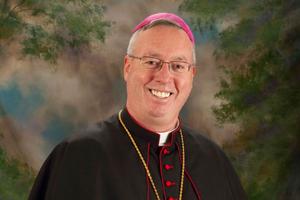Gaudete Sunday: Advent’s Call to ‘Rejoice Always’
User’s Guide to the Third Sunday of Advent

Sunday, Dec. 17, is the Third Sunday of Advent. Mass readings: Isaiah 61:1-2A, 10-11; Luke 1:46-48, 49-50, 53-54; 1 Thessalonians 5:16-24; John 1:6-8, 19-28.
This Sunday is traditionally called Gaudete Sunday, based on the Introit for the day: Gaudete in Domino semper, iterum dico, Gaudete, from Philippians 4:4 (“Rejoice in the Lord always; again I say, ‘Rejoice’”). Today, this theme is developed most fully in the second reading, which is from 1 Thessalonians. Let’s take a closer look at that reading and what is meant by the admonition to “rejoice.” It is surely more than feeling mere emotional joy. The goal is a deep, serene, confident and stable joy of the Holy Spirit.
The text says, “Pray without ceasing. In all circumstances give thanks, for this is the will of God for you in Christ Jesus. Do not quench the Spirit.”
Prayer without ceasing is a discipline of the mind. St. Paul does not mean that we should stay in a chapel all day long. He means that we should be living in conscious contact with God at every moment of our day. To be grateful in all circumstances means that we must remember that “all things work for good for those who love God, who are called according to his purpose” (Romans 8:28); even the painful things bring forth blessings. The Holy Spirit wants this grateful spirit to be ours, and we ought not quench his gift to us of being always gratefully aware of God’s goodness.
The text says, “Do not despise prophetic utterances. Test everything; retain what is good.” First, the phrase “prophetic utterances” refers to Scripture. But there are also approved visions and prophecies that have been permitted us by the Church. Scripture is a prophetic declaration of reality. We ought not to despise God’s word in any way, but should accept it wholeheartedly. “Prophetic utterances” also refers to the teachings of the Church, the words of the Fathers of the Church, and the teachings of the saints down through the ages. There is a great deposit of faith that has been carefully collected and lovingly handed down from apostolic times. We, too, ought to seek out every instruction prophetically uttered by Mother Church, allowing nothing to fall to the ground. Approved apparitions, prophecies and spiritual works are also a source for us too; and we should seek out the witness of Mary and the saints of old who kept and handed on the faith.
The text says, “Refrain from every kind of evil. May the God of peace make you perfectly holy; and may you, entirely, spirit, soul and body, be preserved blameless for the coming of our Lord Jesus Christ. The one who calls you is faithful, and he will also accomplish it.” The greatest source of sorrow in our life, the biggest killer of joy, is sin. To the degree that we indulge it, our joy is sapped, but to the extent that we allow the Lord to deliver us from sin and make us more and more holy, our joy becomes deeper and more lasting.
The words “holy” and “whole” are not far removed from each other. As we become more whole, more perfected, freer from sin, more holy and blameless, our joy deepens and we can increasingly “rejoice always.” God will do this for us if we are willing and if we ask him.
Thus the mandate, the exhortation, to “rejoice always” is a call to live a stable and serene joy rooted in prayerful gratitude.
















